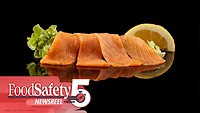EU Reports on 2021 Food Safety Notifications: Pesticides, Fraud Highlighted

Credit: ribkhan via Pixabay
In 2021, the EU experienced an increased number of food safety notifications that were sent through the online Rapid Alert System for Food and Food Network (iRASFF) in comparison to previous years, according to a recent Alert and Cooperation Network (ACN) report. iRASFF is managed by the European Commission (EC) and allows Member States to exchange information about non-compliances and violations of EU agrifood chain legislation.
ACN and iRASFF
ACN comprises several networks, including the Rapid Alert System for Food and Feed Network (RASFF), the Administrative Assistance and Cooperative Network (AAC), and the Agrifood Fraud Network (FFN). Members of ACN include all EU Member States, European Economic Area nations, Switzerland, and EC. Additionally, special arrangements have been made to enable Northern Ireland to participate in iRASFF.
Each of the three networks within ACN—RASFF, AAC, and FFN—serve different purposes within the network, and contribute unique information to iRASFF. Risks to human, animal, or environmental health from food or feed is handled by RASFF; cross-border violations of EU agrifood legislation that do not pose an immediate health risk are handled by AAC; and fraudulent or deceptive practices related to food products are handled by FFN. All information exchanges between the networks take place via iRASFF, which allows ACN networks to submit notifications related to risks deriving from food, food contact material, and feed as a result of non-compliance or fraud.
Notifications and Trends
According to the report, the year 2021 recorded the highest number of iRASFF exchanges ever reached for all three ACN networks. RASFF submitted 4,607 notifications throughout 2021, supplemented by 19,064 follow-up notifications. Additionally, 2,290 non-compliance notifications were shared throughout 2021, which led to 4,694 conversations between ACN members. Finally, 407 notifications of suspected fraud were submitted in 2021. The report includes highlights of key notification trends.
Pesticides were the most common cause (27 percent) of health-related notifications, with 468 RASFF notifications related to usage of the unauthorized pesticide ethylene oxide. A considerable number of pesticide notifications were associated with pesticides for which EU recently repealed authorization.
There were also a total of 863 health-related notifications submitted that concerned pathogenic microorganisms, with Salmonella, Listeria monocytogenes, Escherichia coli, norovirus, Bacillus cereus, and other microorganisms accounting for 73 percent, 16 percent, 6 percent, 2 percent, 1 percent, and 2 percent of notifications, respectively. Almost half of notifications (334) related to Salmonella were linked to poultry and poultry products. L. monocytogenes notifications were mostly caused by milk and milk products, poultry, and fish. The majority of E. coli notifications concerned Shiga toxin-producing E. coli (STEC) found in meat, and most norovirus notifications were related to mollusks and oysters. The report states that the number of notifications related to foodborne pathogens has been slightly decreasing in recent years.
The report explains that 33 foodborne illness outbreaks were notified through RASFF in 2021. Of the 33 foodborne illness outbreaks, 14 were linked to Salmonella, four were linked to L. monocytogenes, four were linked to histamine poisoning, three were linked to norovirus, and three were linked to E. coli. Furthermore, nine outbreak notifications were related to multi-country outbreaks.
Looking for quick answers on food safety topics?
Try Ask FSM, our new smart AI search tool.
Ask FSM →
Mycotoxin presence in food was the third most notified hazard category in 2021, accounting for 450 cases. Most of the mycotoxin notifications were related to aflatoxins detected in nuts. Other frequently notified food hazard categories include allergens, food additives, and unauthorized substances.
Additionally, a total of 281 notifications were related to e-commerce. Approximately half of the e-commerce notifications concerned dietetic foods, food supplements, and fortified foods. Notifications regarding food contact materials (FCMs) made up 33 percent of the category, which is more than double the number of FCM notifications that were submitted in 2020. The report notes that many FCM notifications were submitted due to ongoing EU enforcement actions taken against non-authorized bamboo “powder” in FCMs that began in May 2021; nearly 90 percent of the non-authorized bamboo “powder” FCMs on the market are offered on e-commerce platforms.
Regarding fraud, 407 notifications were submitted in 2021. The most common food categories that were the subject of fraud-related notifications are, in order: fish and fish products, fats and oils, and meat and meat products. Specific causes for the notifications included undeclared added water, sugar adulteration, illegal use of carbon monoxide treatment, abuse of additives such as ascorbic and citric acid, the presence of nitrates and nitrites, inadequate labeling, forged documentation, illegal trading, and falsification of documents.
The majority of notifications that were submitted in 2021 originated from official controls. Only 4 percent of notifications were due to consumer complaints.
EU Coordinated Efforts
The report highlighted several efforts that took place across the EU in 2021 to ensure the safety of the continent’s food supply. For instance, an ongoing enforcement action that was launched in May 2021 aims to ensure that plastic FCMs containing illegal additives—such as bamboo “powder”—are rejected at EU borders and do not enter the market, as well as to recover tax duties for plastic products that were wrongly declared, inform business operators about the illegality of relevant FCM additives, and educate consumers of the issue and potential health risks.
EU also obtained the results of its first coordinated control plan for herbs and spices in 2021. The plan represents the largest investigation into the authenticity of culinary herbs and spices to date, with 21 participating Member States—plus Switzerland and Norway—carrying out nearly 10,000 analyses of 1,885 samples. Cumin, curcuma, oregano, paprika, pepper, and saffron were evaluated for their risk of adulteration. Oregano was identified as the most vulnerable, with 48 percent of samples at risk of contamination, typically with olive leaves. Pepper, cumin, curcuma, saffron, and paprika had contamination levels of 17 percent, 14 percent, 11 percent, 11 percent, and 6 percent, respectively.
Finally, the report underlines a special action that took place in 2020–2021 to combat the illegal introduction of horse meat into the food chain. Member States observed the movement of horse trafficking across the continent and found that the problem would shift to countries with more permissive controls. Member States also found a reduction in the number of horses slaughtered in counties where numerous checks have been carried out. Several hundred falsified passports were confiscated and criminal organizations have been identified in some countries. The effort to eliminate illegal horse meat from the EU food supply is ongoing.Future Developments
EC will continue to advance the iRASFF platform, including by developing a new, specialized Plant Health Network for the exchange of notifications on plant health issues. Specific coordinated actions are taking place to follow up on suspicious, cross-border fraudulent activities, such as the sale of FCMs containing bamboo. EC will also focus on encouraging Member States to join EU-coordinated food safety efforts and enhance communication with non-EU nations.









